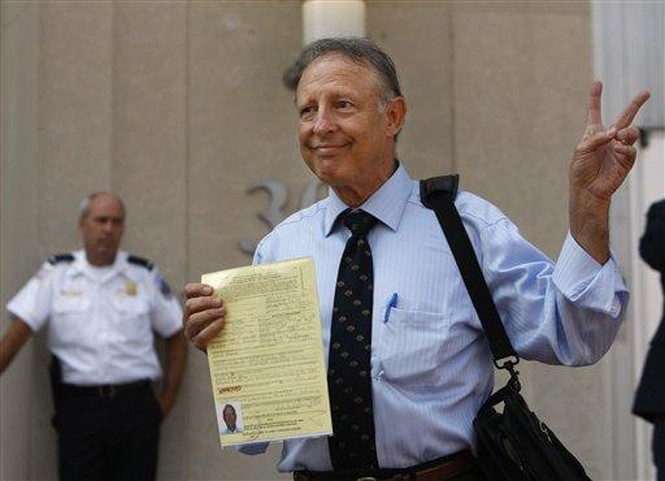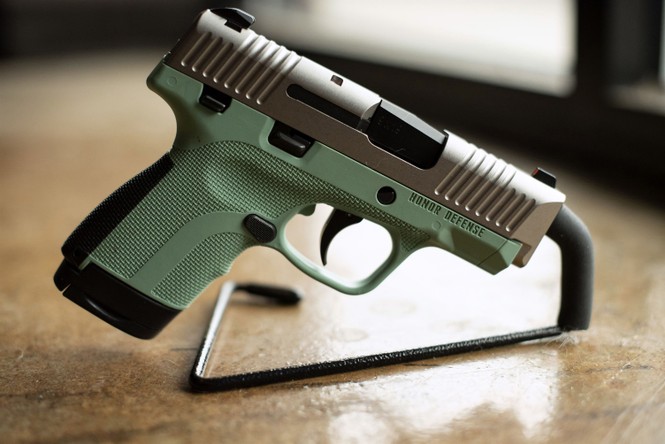On June 26, 2008 — 10 years ago today — the Supreme Court of the United States ruled in the District of Columbia v. Heller case in a 5-4 decision. The Court ruled that "the Second Amendment protects an individual's right to own a firearm unconnected from service in a Militia and that a firearm may be used in a traditionally lawful purpose, such as for self-defense in the home."

About The Case
From the Supreme Court's case summary:
District of Columbia law bans handgun possession by making it a crime to carry an unregistered firearm and prohibiting the registration of handguns; provides separately that no person may carry an unlicensed handgun, but authorizes the police chief to issue 1-year licenses; and requires residents to keep lawfully owned firearms unloaded and disassembled or bound by a trigger lock or similar device. Respondent Heller, a D. C. special policeman, applied to register a handgun he wished to keep at home, but the District refused. He filed this suit seeking, on Second Amendment grounds, to enjoin the city from enforcing the bar on handgun registration, the licensing requirement insofar as it prohibits carrying an unlicensed firearm in the home, and the trigger-lock requirement insofar as it prohibits the use of functional firearms in the home. The District Court dismissed the suit, but the D. C. Circuit reversed, holding that the Second Amendment protects an individual’s right to possess firearms and that the city’s total ban on handguns, as well as its requirement that firearms in the home be kept nonfunctional even when necessary for self-defense, violated that right.
The Supreme Court ruled in Heller's favor, saying "the Second Amendment protects an individual's right to own a firearm unconnected from service in a Militia and that a firearm may be used in a traditionally lawful purpose, such as for self-defense in the home."
Recommended
In addition to striking down D.C.'s handgun ban, Heller was also promised
The term "militia" has been a heavily-debated but SCOTUS ultimately decided the following:
The “militia” comprised all males physically capable of acting in concert for the common defense. The Antifederalists feared that the Federal Government would disarm the people in order to disable this citizens’ militia, enabling a politicized standing army or a select militia to rule. The response was to deny Congress power to abridge the ancient right of individuals to keep and bear arms, so that the ideal of a citizens’ militia would be preserved.
SCOTUS also made it clear that the Second Amendment does not protect every firearm. The Court, however, did rule that D.C.'s handgun ban and the trigger-lock requirement violated the Second Amendment:
The District’s total ban on handgun possession in the home amounts to a prohibition on an entire class of “arms” that Americans overwhelmingly choose for the lawful purpose of self-defense. Under any of the standards of scrutiny the Court has applied to enumerated constitutional rights, this prohibition—in the place where the importance of the lawful defense of self, family, and property is most acute—would fail constitutional muster. Similarly, the requirement that any lawful firearm in the home be disassembled or bound by a trigger lock makes it impossible for citizens to use arms for the core lawful purpose of self-defense and is hence unconstitutional.
Listen to the original oral arguments that took place:
The Court ruled 5-4 with Justices Scalia, Roberts, Kennedy, Thomas and Alito ruling in Heller's favor. Justices Stevens, Souter, Ginsburg and Breyer voted in favor of Washington, D.C.

What Others Are Saying About The Decision
Townhall reached out to pro-gun groups and asked them about the significance of the Heller decision. Here's what they had to say:
Alan Gottlieb, Founder and Executive Vice President of the Second Amendment Foundation:
The Heller decision is the cornerstone of Second Amendment litigation. Without it the McDonald Supreme Court decision that incorporated 14th Amendment protection of Second Amendment rights would not have been possible. And without McDonald all of the victories in federal court that have struck down a number of other anti-gun rights laws would not have happened. We all in the gun rights movement owe attorney Alan Gura, who argued both Heller and McDonald at the U. S. Supreme Court, a large debt of gratitude on this Tenth Anniversary of this important event.
Larry Keane, Senior Vice President and General Counsel for the National Shooting Sports Foundation:
The significance of the Heller decision is vital to our industry because it recognized what we have known to be true. The right to keep and bear arms is a right reserved by an individual, granted to us by our Creator and enshrined in the Bill of Rights alongside the individual rights to free speech, exercise of religion, and a free press. This is why National Shooting Sports Foundation filed a friend of the court brief for Heller v. District of Columbia.
Our rights are inherent and unalienable. They are birthrights, pre-existing before the constitution. They are sacred and beyond the reach of government, not granted by government. They are rights, period. The first 10 amendments, known as the Bill of Rights, tells the government in eight of those, what the government can’t do.
The late Justice Antonin Scalia’s sound legal acumen was clear and succinct when he wrote in the majority decision, “There seems to us no doubt, on the basis of both text and history, that the Second Amendment conferred an individual right to keep and bear arms.
That importance of that decision was demonstrated during the confirmation hearings for Justice Neil Gorsuch when he was grilled by Sen. Dianne Feinstein (D-Calif.) on what she considered were the limits of the Second Amendment. Justice Gorsuch noted the landmark significance of the limits on the government to regulate individual rights when he told the senator, “Whatever’s in Heller is the law, and I follow the law. It is not a matter of agreeing or disagreeing, senator, respectfully, it’s a matter of it being the law and my job is to apply and enforce the law.
Erich Pratt, Gun Owners of America's Executive Director:
The date of June 26, 2008, was a great day for freedom. Because it was on that day -- ten years ago -- that the highest court in our land recognized the individual right of decent people to own a firearm for protection.
GOA submitted a hard-hitting amicus brief to the Supreme Court prior to the decision.In fact, after looking at all the briefs which were submitted in the Heller case, the editors at USA Today decided to use GOA for their “Opposing Voice” on March 19, 2008.
The paper’s editors told our attorneys that GOA had an argument that was clearly distinctive, as were the only ones to argue that the words “shall not be infringed” invalidated all federal gun control laws.
But that’s not the only reason the GOA brief was so hard-hitting. Our brief also presented the greatest reason for the right to keep and bear arms, stating that “the Second Amendment right is to be exercised as a last resort to guard against tyranny.” You can imagine our delight when we saw the Supreme Court echo this concept on pages 24-25 of the Heller decision.
The Court said that when the citizens of a nation are armed, 'they are better able to resist tyranny.' The pages of our own history clearly show this to be true. The Heller decision set in motion a series of events that eventually resulted in several gun bans being repealed or struck down from coast-to-coast.
And, of course, the Heller decision was instrumental in setting the table for the McDonald decision in 2010 -- a decision that made it clear that states and localities are NOT at liberty to infringe upon a fundamental liberty such as the right to keep and bear arms.
Obviously, Heller was not the end of the fight. There are still many judges who are ignoring the Heller decision and who, quite frankly, ignore the Second Amendment, as well. And so we continue to fight for our freedoms -- in the courts, in the Congress, and in state legislatures across the country.
Tyler Yzaguirre, President of the Second Amendment Institute:
The Heller decision is the reason why our Second Amendment rights are so strong today. Without the Heller decision, our Second Amendment rights would be in constant dire peril. Thanks to DC v. Heller, over 300 pro-second amendment cases have been brought before the courts, and have produced major victories including McDonald v. Chicago, and Wrenn v. D.C.
Tim Schmidt, Founder and President of the United States Concealed Carry Association:
In 2008, the Supreme Court ruled in favor of individual Second Amendment rights by affirming an individual’s right to self-defense in the case of Heller v. District of Columbia. As we celebrate the tenth anniversary of that decision, we maintain that the Supreme Court should not shy away from any Second Amendment case, especially in the next few years. This is a crucial time frame that could determine the status of Second Amendment rights in this country for decades to come, and with a pro-Second Amendment majority on the bench, those who respect the Constitution should not pass up this opportunity to strengthen and protect one of America’s most sacred rights.

























Join the conversation as a VIP Member